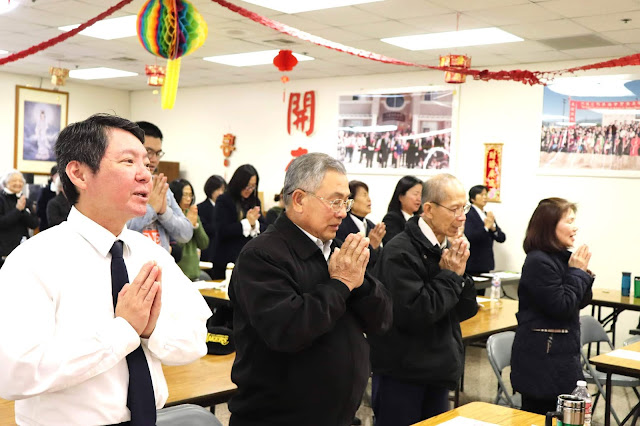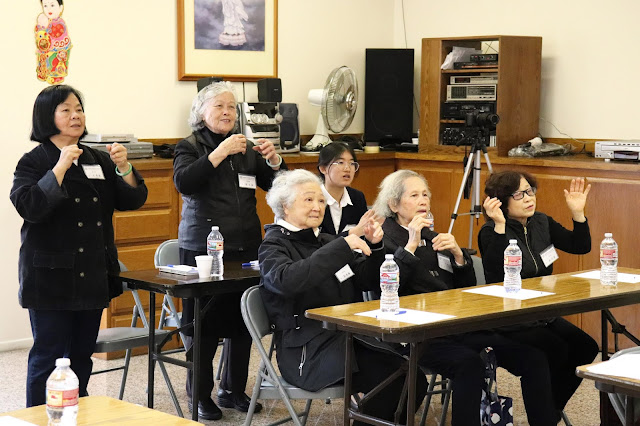◎ 美國洛杉磯全真道院 陳柏瑋
Thanks to the Grace of Heaven and the Holy Teacher for giving me the opportunity to attend the 2020 Sutra Seminar. I was very fortunate to attend the seminar twice. First at Tian Hui in Cupertino on February 1st and February 2nd and then at my home temple, The Great Tao Foundation of America, on February 7th and 8th. I am very grateful to the Taiwan team: Lecturer Meg Chen, Lecturer Chin-Shih Hung, Virtue Studies Class Leader Olivia Chen and Zhong Shu Institute Year 4 Assistant Class Leader Laura Chen, for facilitating such an exemplary seminar.
The seminar was outstanding in how much was accomplished in such a short amount of time. In the span of two days, Lecturer Meg Chen and Lecturer Chin-Shih Hung were able to effectively train attendees on how to successfully run a youngster sutra class. Condensing years of experience into two days of classes is no small feat and although there are areas of information that could not be covered simply due to time limitations, the fundamentals were skillfully passed on through lectures, hands-on activities and discussions.
 |
| ▲ 培訓營帶來深刻的震撼。 |
I found the hands-on activities to be especially memorable. From having Class Leaders Olivia and Laura teach variations of the classic ‟Love Clap” to simulating an actual sutra class, this was the first time I had attended a seminar where the activities were so well integrated into the lecture material. Listening to the lecturers share their knowledge and watching the veterans demonstrate leading a class was easy but as we all know, observing and actually doing it ourselves are two very different things. As someone whose Mandarin is conversational at best, these activities had a greater impact on me than most of the other attendees. I would like to thank my exercise partners once more for the awkward moments of silence when I ran out of ways to promote learning sutra. Three minutes of talking can be quite a long time. However, most if not all, definitely benefited from these exercises. Practicing what is being taught in lectures is a straightforward concept that can produce fantastic results. It serves many purposes: attendees are focused in lecture, reinforces the material, provides opportunity to gain experience and dissipates nerves of having to stand in front of an audience and teach. It is a practice that I hope to see more incorporated in the future when the circumstances allow for it.
Whereas the hands-on activities served an excellent purpose of creating an atmosphere of enthusiasm and participation, the lectures themselves were rich with knowledge. In great part due to Lecturer Meg Chen and Lecturer Chin-Shih Hung’s adept lecturing abilities, the information was presented in a well-organized and easy to comprehend manner. As this was a seminar on hosting a sutra class, the material was tailored as such. If one looks a little beneath the surface though, one can find that it was also a seminar on human psychology. What is the most effective way to build relationships? How do we keep children interested and focused on learning when many have a lot of energy and will find it hard to sit still? Make them want to come back? What are the differences between parents and children and how do we cater to both? Why is it very important to initially meet parents who do not have an I-Kuan Tao background where they are at but also have them aware of the said background? These questions and many more were masterfully addressed by the lecturers and what I believe makes the seminar truly stand out.
 |
| ▲ 演練時熱情參與,學習讀經帶動技巧。 |
For example, when I was attending the seminar the first time at Tian Hui, one part of Lecturer Chin-Shih Hung’s lecture really stuck with me. It had me view the entire two days with this additional psychology perspective. Lecturer Chin-Shih Hung was sharing how almost every family that goes through the sutra classes end up receiving Tao and make the transition into the Tao society. This achievement alone is already highly impressive but as one who has grown up in the temple and knows how hard it can be to propagate Tao, accomplishing this in such a short amount of time and being able to replicate the results again and again is nothing short of extraordinary. For one session of sutra classes to be three to four months long, one time a week for one hour, is very little time. Yes, there has to be a lot of additional behind-the-scenes work through online platforms and scheduled get-togethers outside of class but regardless, a very thorough and well-developed strategy must be utilized for this to be so successful. Paraphrasing and translating what Lecturer Chin-Shih Hung said in her lecture, ‟The Tao society mindset is traditionally to have everything done nicely for a new Tao member in order to have them feel comfortable. We do not want to inconvenience them in fear of scaring them away. This is not effective. Instead, the more we can have parents and children help out, the better.” My own conclusion to this, and from my own beliefs, is that essentially people tend to develop relationships faster and easier through shared experiences. It is typically the actions and not words that make the greater impact on a day-to-day basis. Both are crucial and complement one another but as a whole, we may often neglect the actions a little more when interacting with the general Tao member.
This is only one of numerous tidbits of wisdom presented at the seminar. What we have learned in these two days is how to utilize sutra classes to get prospective Tao members to the door and receive Tao. As attendees, we are privileged to receive all this invaluable knowledge simply by attending, listening and partaking in the seminar. Lastly I would also like to dedicate my sincere gratitude to the Tao Administrative Centre in facilitating this successful Sutra Seminar. I trust that through this exchange and dialogue we have planted a seed of hope, which one day this seed will flourish so that more and more locals can learn about the great depth of the wisdom and philosophies of Oriental Saints, eventually leading to more and more sentient beings with affinity to benefit from the Buddhas’ great blessings!
一場難能可貴的社區讀經師資培訓營
◎ 中譯 詹薏靜
感謝 天恩師德,讓後學有機會參與這次2020年的社區讀經師資培訓營。後學很幸運能夠參與培訓營兩次,第一次是2月1日及2日在美國庫比蒂諾的天惠堂,第二次則是2月7日及8日在後學所屬的美國洛杉磯全真道院。由衷感謝臺灣團隊——陳玉梅講師、洪青詩講師、陳芝維學長及陳玟寧學長——讓此次的培訓營得以圓滿順利。
在有限的時間內達成不可能的任務,是這次培訓營令人讚嘆之處。兩天的培訓營中,陳玉梅講師及洪青詩講師有效率地培訓學員們如何成功地運作親子讀經班。她們將累積數年的經驗濃縮在兩天的課程中,這絕對不是簡單的事情。雖然有些資訊受限於時間無法涵蓋其中,但是她們依然有技巧地將運作班程的基礎原則透過專題、體驗活動及研討傳遞給我們。
後學發現體驗活動最令人印象深刻。從芝維學長及玟寧學長所傳授給我們,活絡讀經班氣氛的不敗經典款「愛的鼓勵」的各種變化式可以感受得出,這是後學參加過那麼多次營隊以來,首次體會到體驗活動可以如此天衣無縫地融入在專題的內容中。我們都知道,聽講師講道理與看經驗老到的前輩學長們示範領導班級很簡單,但是觀察他人與自己親手做,是兩件完全不同的事情。後學的中文最多只能對話溝通,因此這些活動帶給後學的震撼比其他學員更大。再次感謝後學練習時的好夥伴們,當後學想不出推廣讀經的方法,而導致氣氛尷尬的沈默時刻,是你們拯救了後學。上台發表三分鐘是相當難熬的,然而幾乎所有學員都因這些演練的機會而獲益良多。將專題中所學實際演練的簡單概念,能產生意想不到的效果。它有很多功能:讓學員專注於課程、強化教材、提供增加經驗值的機會,以及減緩上台講話及教學的緊張感。未來如果環境許可,希望有更多的機會讓我們做這樣的練習。
 |
| ▲ 圍圈演練3分鐘說明親子讀經的好處,藉此邀請親友及成全道親參加親子讀經班。 |
儘管體驗活動對於塑造活絡氣氛及提升參與度有很好的效果,專題本身更是內容豐富。主要原因是陳玉梅講師及洪青詩講師熟練的專題講述技巧,有組織地陳述理念,讓我們不費吹灰之力即能理解。這個培訓營的重點是訓練帶領讀經班的人才,所以專題內容也都依此目的設計。如果再深入地探討,就會發現這也是一個與人類心理學相關的培訓營。最有效地與他人建立關係的方法是什麼呢?如何讓精力充沛又坐不住的孩童們,願意學習並保持專注?怎樣讓他們願意再回來讀經班呢?家長與孩童的區別在哪?又該如何符合兩者的需求?為什麼一開始就與非一貫道道親的家長們在一貫道的環境見面,並讓他們了解一貫道背景是如此地重要呢?講師們將這些提問與其他更多的問題有技巧地放進專題內,我相信這就是此次培訓營那麼與眾不同的原因。
舉例來說,當我在天惠堂首次參與讀經師資培訓營時,洪青詩講師之專題的某一部分讓我永難忘懷,這也讓我另以心理學的觀點去看待這兩天的培訓營。洪青詩講師與我們分享,幾乎所有參與讀經班的家庭最後都會求道,並且走入道場。單單這樣的成就,已讓人深深佩服,而身為道化家庭長大的後學深知要向他人傳道是多麼困難的一件事,能在這麼短的時間內達成這樣的成就,且一次又一次地達成目的,更是非常了不起!讀經班每週只有一堂一小時的課程,一學期總共三到四個月,時間並不長。沒錯,除了原有的課程外,必定有大量幕後工作,包含網路社群平臺的運用、戶外聯誼活動的舉辦等等。儘管如此,使用一個規劃完整又全面的策略,才是讀經班如此成功的主因。引述並翻譯洪青詩講師在課堂上所講的:「道場傳統的觀念是把所有事情都做得盡善盡美,讓新道親們來佛堂時,像回到家一樣。我們不希望因為任何的不便而讓他們不敢再來佛堂。但是這樣做的效果不大。相反地,我們讓家長及孩童幫越多忙越好。」對於這段話我的結論是──也是我的信念──基本上與他人擁有共同的體驗,可以讓人們更快速又輕易地建立關係。這就是典型的例子:行動比言語在日常生活中更有影響力。兩者都很重要,且應相輔相成,但整體來說,我們或許太過於忽略與一般道親相處時的活動方式。
 |
| ▲ 研討會第二天適逢元宵節,天廚菩薩慈悲做湯圓給大家吃。 |
這只是這個培訓營眾多精闢言論的其中一段。我們在這兩天內學到的,是以讀經班作為媒介,引領可能成為道親的人們進入道門,並成功地求道。作為學員,我們只不過是參與培訓營、出席課程及聆聽專題,就有幸聽到所有寶貴的道理。最後,後學要對道務中心舉辦這麼成功的社區讀經師資培訓營表達最誠摯的感謝。後學相信,經過這樣的對話與交流,我們已經在當地人心中種下希望的種子;有一天種子將長出新芽,讓越來越多的當地人能夠了解東方聖人深厚的智慧與哲學,最終引領更多的有緣佛子求得寶貴的大道!







沒有留言:
張貼留言